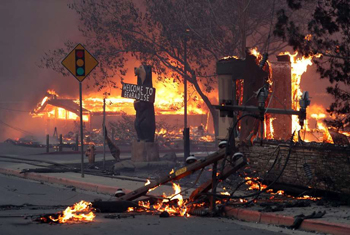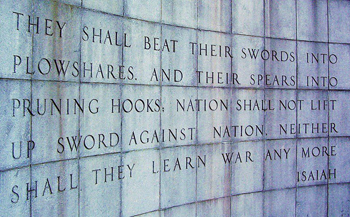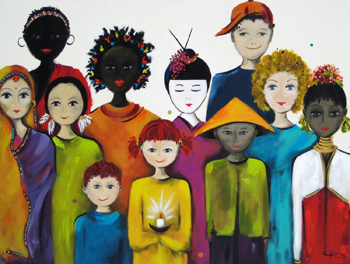For Sunday July 26, 2020
Lectionary Readings (Revised Common Lectionary, Year A)
1 Kings 3:5-12
Psalm 119:129-136
Romans 8:26-39
Matthew 13:31-33, 44-52
We are happy to offer a guest essay this week, written by Michael Fitzpatrick. Michael is a doctoral candidate in philosophy at Stanford University, and a parishioner at St. Mark's Episcopal Church in Palo Alto, CA. He "loves exploring the Bible, theology, and the Anglican tradition, and dreams of a world where Christians of all denominations set aside their differences and worship God with one voice."
Before November 2018, few seemed familiar with Paradise, California, the hometown for my wife and her family. Since that fateful month, most of the United States and even many overseas know about “Paradise lost.” In a matter of hours, a fire moving at the speed of football fields per second wiped out over 85% of the structures in that quiet community nestled at the foot of the Sierra Nevada mountain range.
 |
My in-laws evacuated to spend a sleepless night with friends in neighboring Chico, staring out the bedroom window at the terrifying orange aura pulsating beneath a smoke cloud blacker than the dead of night surrounding it. The next day, my wife flew in to Sacramento, the nearest airport, to be with her devastated parents. While she was in flight, a freelance photojournalist she knew through her work was tromping into the smoldering remains of the hillside hamlet. Crawling over still warm, blackened logs and through the rubble of lost homes, he came across her parent’s house, still standing. Everything had burned around it, but the home stood.
My wife’s parents had no idea as they waited by the baggage carousel in Sacramento Int’l Airport. When my wife landed on the tarmac and turned off the airplane mode on her phone, it lit up with a series of photographs in text messages. A few minutes later, she walked out of the security partition into the baggage claim, and after her mom hugged her, my wife held up her phone with the photos emblazoned on the screen.
That is what it means to receive good news.
As Christians, we are Good News people, Gospel people. Sometimes I fear that we have forgotten how our faith is supposed to be Good News, not just for us but for everyone. The news outlets these days feature a litany of people who are desperate for some good news. The whole human race is battling the COVID-19 pandemic. In North America and in parts of Europe, the Black Lives Matter movement is pressuring western societies to finally confront their appalling history of violence towards people of color. As I write this thousands of Christians are being butchered for their religious identity in Sudan and Nigeria. In a world of such horrors, what distinctive good news can our faith possibly have to offer?
Well, let’s start with the Good News that Jesus himself preached to the poor, the prisoners, the blind, and the oppressed (Luke 4.18-19). He taught his followers to receive a new identity as citizens of the Kingdom of Heaven. This Kingdom is the society where the love of God is the ruling authority, drying all tears, healing all wounds, reconciling all enemies, flattening all swords into ploughshares, rooted in the sacrificial servitude of Jesus as the very incarnation of “God so loved the world…”
Sounds wonderful, doesn’t it? So where do we buy bus tickets to this fabled Kingdom? Do we have the workers unite, take over the halls of power, and force everyone to love each other through government legislation? In our Gospel reading appointed for today, Jesus seems to speak of a better way. Employing a series of arresting, tactile images drawn from mundane peasant life, Jesus describes the Good News of the Kingdom as like a tiny seed planted in the field of the world, growing into a large bush that fills the land. The Good News of the Kingdom is a smidgen of yeast dropped into the dough that slowly mixes until the whole batter begins to rise.
 |
Jesus’ way to end oppression and injustice and poverty and pandemic is … to let hearts be transformed person by person through the love of God until this pale blue dot is brimming with Kingdom citizens who know God through Jesus. Evangelism and the Kingdom go hand in hand. We do not transform the world into the Kingdom by our activism; as theologian Georgia Harkness admonishes in her book Understanding the Kingdom of God, “The Kingdom of God is God’s gift, not a human achievement.” That doesn’t mean there is no labor for us as Kingdom people. We participate in God’s work even as we recognize it is God’s. As we labor, it is for the justice of the Kingdom, not some worldly ideology or political ambition.
This may seem very different than what many of us were taught. In my childhood, the “good news” seemed to be that I would struggle through this life of suffering and persecution only to die and finally go away to be with Jesus somewhere else. In other, more pernicious contexts, the “good news” was purely negative: I wasn’t going to burn forever in a lake of fire. Neither of these messages offer good news to the cries around the world of people who can’t breathe in hospitals with too few ventilators, who can’t breathe as the strong kneecap of the lawman crushes their windpipe, who can’t breath through all the blood in their lungs from Fulani machetes.
Jesus’ preaching and embodiment of the Kingdom of Heaven is Good News because it means God has not abandoned this world to sin but is working now to redeem this world, this history, these suffering people. In a particularly poignant essay entitled “The Christian Hope,” Bishop John A. T. Robinson writes, “Christians are those whose hope is from heaven, not for heaven; or, rather, not for heaven as opposed to earth. Their promise is of a renovated cosmos which will include a new heaven and a new earth, an order, that is to say, in which all things, spiritual and material, shall be fully reconciled in Christ. It is a hope for history, not a release from history.” The Good News is that through God’s only Son, our God has risked everything for our salvation; all things corrupted by sin and death shall be resurrected into new life.
Such Good News is what animates St. Paul’s many effusions throughout his epistle to the church in Rome. The first eleven chapters of Romans work out one of the central hallmarks of the Kingdom of Heaven, that in God’s family “there is no distinction” between people (Romans 3.22b). Class, race, sexual orientation, wealth, fame, gender, religion, marriage, political party — none of these categories by which we carve up humanity into various tribes counts for or against a person in the Kingdom. In this Sunday’s epistle, St. Paul is speaking to anyone who has been told their identity precludes them from God’s promises.
 |
Our union with Christ has given us a new identity, for we are a new creation. Central to this identity is that “God is for us.” St. Paul then asks, “If God is for us, who is against us?” Even if we are persecuted and oppressed for our earthly identities, “God for us” is not earthly, but heavenly, our citizenship in the Kingdom. Marked by this identity, the identity wherein our advocate and vindicator is none other than the Creator of this universe, justice will reach all our other identities. God will not cease to fight for us when God did not withhold even the only begotten Son of the Most High, who was given up for us all. If even the sacrifice Jesus offered on the cross is worth our redemption, will God not redeem us in all things?
Who will bring a charge of abuse against us, for our skin color, for the design of our bodies, for our refugee status, for the blood that runs in our veins? “It is God who justifies; who then condemns?” God, the righteous judge, has appointed Jesus, who died and was raised, to be our advocate. What persecution is left that can stand against God? What can separate us from the love of Christ?
St. Paul’s letter erupts in a verbal fusillade of every evil that he can think of that consumes and destroys human life, asking whether any of it can have final victory over those whose citizenship is in heaven. Can hardship, or anxiety, or starvation, or homelessness, or risk of life, or the ravages of war, separate us from the love of Christ after what he did for us on the cross? NO!
For the Good News of God’s kingdom is that when we make Christ Lord of our lives, neither death nor life, neither earthly powers nor the powers of the spirit, neither COVID-19 nor a future climate catastrophe, neither systemic racism nor religious genocide, neither wildfire nor cancer — nay, nothing in the highest heights or the lowest depths of this cosmos, or elsewhere in the whole of creation, has the power to separate us from the love of God in Christ Jesus our Lord. May we commit this day to be people who everywhere live and share the Good News of the love of God in Christ that can never, ever be taken away, and that will, in the end, redeem this fallen world into a Kingdom where the love of Christ is all, and in all, and all in all. Amen.
Michael Fitzpatrick: m.c.fitzpatrick@outlook.com
Image credits: (1) Michael Fitzpatrick; (2) Michael Fitzpatrick; and (3) Michael Fitzpatrick.





